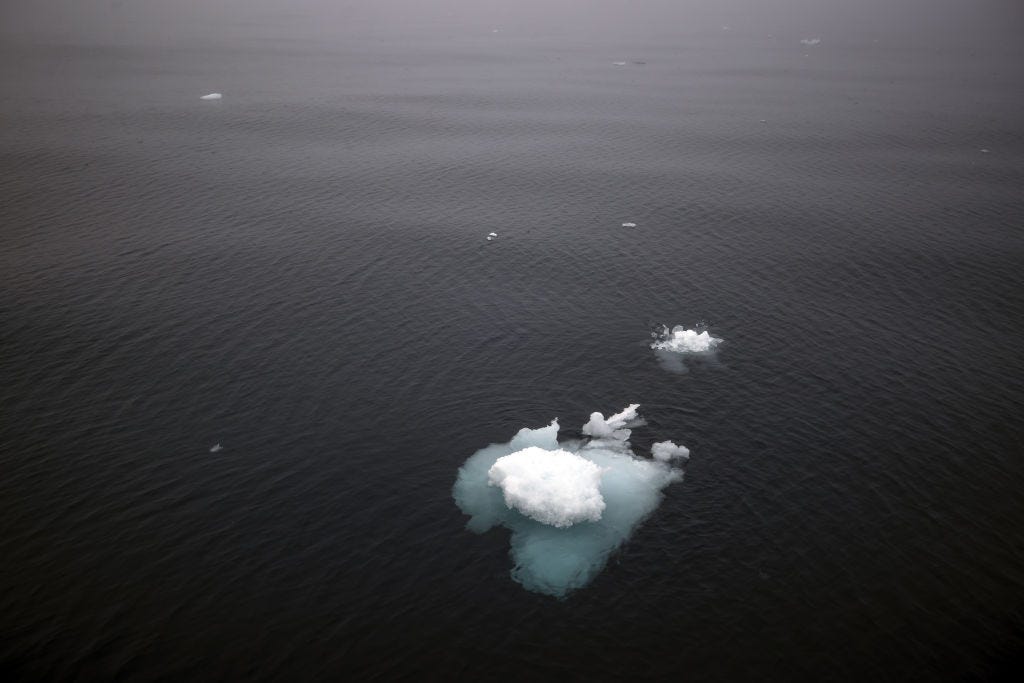TLDR: The Arctic is warming four times faster than we previously thought. That ramps up the pressure to reduce emissions fastest in the next seven years to 2030, rather than backloading it into the final years of 2030-50.
That’s especially important for Aotearoa-NZ because so much of our emissions come from cattle and sheep, which are much more potent in the short term than the long term, and should be measured as such. Also, our politicians have put most of the political weight into reductions in the back half of the next 30 years.
Paid subscribers can see more detail and analysis below the paywall fold and in the podcast above.

Why 2030 is more important than 2050
A couple of bits and pieces of climate news and an excellent explainer on methane caught my eye over the weekend that reminded me of the need to focus on 2030, rather than 2050, in the debates over climate change action.
Firstly, a new study emerged late on Friday confirming the arctic is warming four times faster than the rest of the planet.
A new study, just out yesterday in the journal Communications Earth & Environment, is the latest to weigh in. It finds that the Arctic Circle — the area located above 66.5 degrees latitude — has warmed by more than 5 degrees Fahrenheit since 1979.
In all, the study concludes, the Arctic has warmed at about four times the global average rate over the last 43 years. Scientific American
Secondly, this FT-$$$1 piece about a looming clash between the UN’s ‘Race to Zero’ body and the Mark Carney and Michael Bloomberg-chaired ‘Glasgow Financial Alliance For Net Zero’ over banning coal investments (GFANZ is vague) reinforced to me the need to be much more aggressive in emissions reduction.
This is particularly relevant for Aotearoa-NZ because our most potent emissions in the short run are methane emissions from cattle and sheep. The Carbon Zero Act’s focus on 2050 has been convenient for our farming sector because it back-loads a lot of the effort into the last two decades. That’s also convenient for politicians, including the current Government, because it pushes many of the hardest decisions out to others.
Our politicians today, including Transport Minister Michael Wood, can say in a plausibly deniable way that ‘we’re on track’ for net zero for 2050, largely because most of the big reductions are forecast out in those 2030 to 2050 decades, when the biggest work actually needs to be done in the next seven and a half years.
This explainer on methane from the always excellent Wellington-based science writer Melanie Newfield via her free Substack The Turnstone (I suscribe to it and recommend you do too) also emphasises the need for speed.
Methane makes up 44% of our contribution to global warming, about the same as our carbon dioxide emissions. However, that figure is based on a Global Warming Potential calculated over a period of 100 years, which is perhaps misleading when we are trying to get our emissions to “net zero[1]” by 2050. Remember, if we calculate our methane emissions over a 20 year time scale, as some scientists suggest we should, methane is not 25 times worse for the atmosphere than carbon dioxide – it’s 80 times worse. After all, 2050 is not much more than 20 years away.
So, where does New Zealand’s methane come from? More than 80% comes from cattle and sheep agriculture. Melanie Newfield’s The Turnstone
So far, our farming sector has avoided being included in the Emissions Trading Scheme and has successfully used He Waka Eke Noa to fend off actual action into the vague and convenient future.
I’ll focus more in the coming months on the ‘need for speed’ and what that looks like. I welcome suggestions from paid subscribers in the comments below.
Elsewhere in the news this morning here and overseas:
Poking the dragon again - Five more junior members of the US Congress arrived in Taiwan overnight, re-ramping up the tension with Taiwan after Nancy Pelosi’s visit the previous week. Reuters
Distressing democracy - Anti-vaxx group Voices For Freedom has called on its 100,000 members to make Aotearoa-NZ “ungovernable” and is targeting elections of council candidates in October’s elections. Stuff
Expect 50 basis points - The Reserve Bank of New Zealand is widely expected to hike its Official Cash Rate by 50 basis points to 3.0% at 2pm this Wednesday when it releases its next quarterly Monetary Policy Statement. However, banks have been trimming their main promotional fixed mortgage rates to below 5% in recent weeks as financial markets increasingly see the heat going out of the global economy and allowing central banks to stop hiking once they get near 4% later this year.
Number of the day
US$48.4b - The state-controlled oil producer Saudi Aramco reported a record profit the 90 days to June 30 of US$48.4b, up 90% from a year ago as it took advantage of the surge in oil prices to over US$100/barrel over the last year. Reuters
Some fun things


Ka kite ano
Bernard
This is a ‘gift’ link that will open for free three times. First in, first served.













Share this post